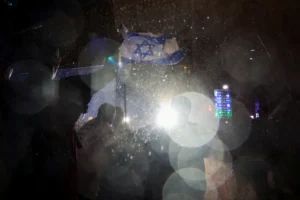Israel after October 7: Between decolonisation and disintegration

Demonstrators hold an Israeli flag as police use water cannons during a protest against Benjamin Netanyahu’s government in Tel Aviv on 18 May 2024
Ilan Pappé writes in Al-Jazeera on 7 October 2024:
A year has passed since October 7, 2023, and it is time to explore if we have a better understanding of this monumental event and everything that followed it.
For historians like me, a year is usually not enough to draw any significant conclusions. However, what happened in the past 12 months falls within a much wider historical context, one that stretches back at least to 1948, and I would argue, even to the early Zionist settlement in Palestine in the late 19th century.
Therefore, what we can do as historians is place the past year within the long-term processes that have unfolded in historical Palestine since 1882. I will explore two of the most important ones.
Colonisation and decolonisation
The first process is colonisation and its opposite – decolonisation. Israeli actions both in the Gaza Strip and the occupied West Bank in the last year gave new credence to the use of these twin terms. They transited from the vocabulary of the activists and academics of the pro-Palestine movement to the work of international tribunals such as the International Court of Justice.
Mainstream academia and media still refuse to define the Zionist project as a colonial, or as it is referred to more accurately a settler-colonial project. However, as Israel intensifies the colonisation of Palestine in the next year, that might prod more individuals and institutions to frame the reality in Palestine as colonial and the Palestinian struggle as anticolonial and dispense with tropes about terrorism and peace negotiations.
Indeed, it is time to stop using misleading language peddled by US and Western media, like “Iran-backed terrorist group Hamas” or “peace process”, and instead talk about Palestinian resistance and decolonisation of Palestine from the river to the sea.
What will help in this effort is the growing disrepute of the Western mainstream media as a credible source of both analysis and information. Today, media executives are fighting tooth and nail against any change in the language, but they would eventually come to regret its place on the wrong side of history.
This change of narrative is important because it has the potential to affect politics – more specifically the politics of the Democratic Party in the United States. The more progressive Democrats have already embraced a more accurate language and framing of what is happening in Palestine.
